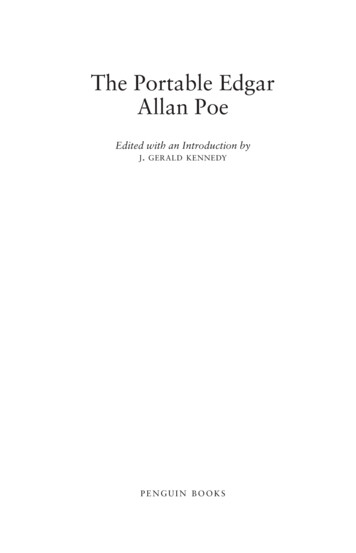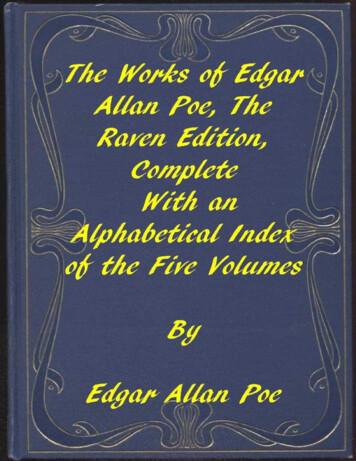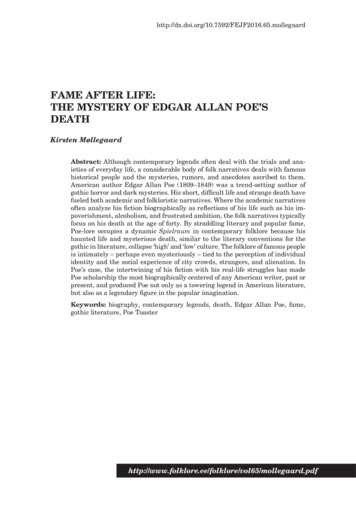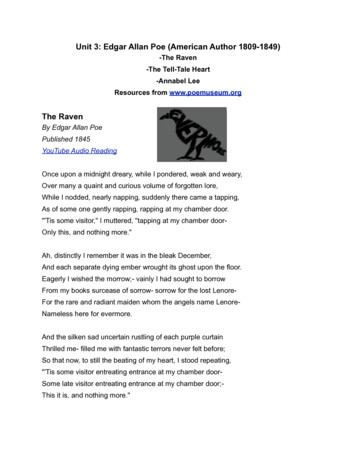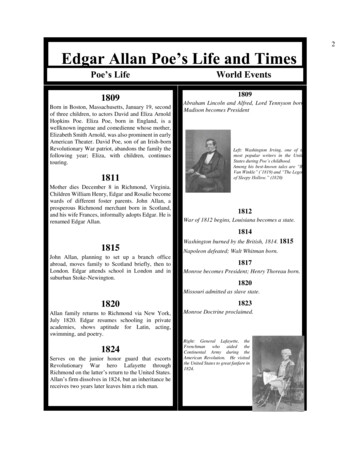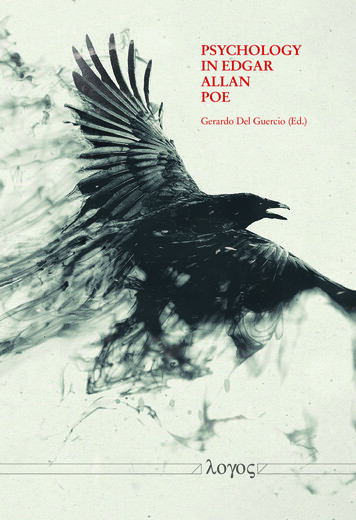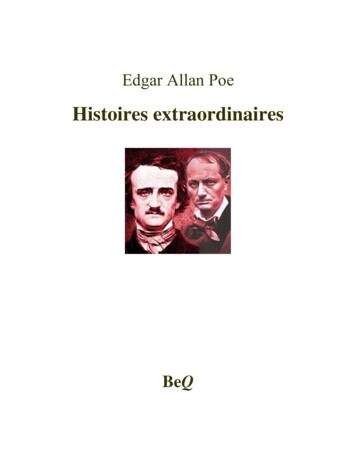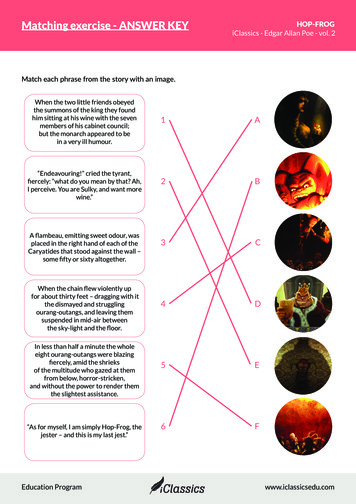
Transcription
The Works of Edgar AllanPoe, Volume 1 of the RavenEditionEdgar Allan PoeThis eBook was designed and published by Planet PDF. For morefree eBooks visit our Web site at http://www.planetpdf.com/. To hearabout our latest releases subscribe to the Planet PDF Newsletter.
The Works of Edgar Allan PoeEDGAR ALLAN POE ANAPPRECIATIONCaught from some unhappy master whom unmercifulDisasterFollowed fast and followed faster till his songs oneburden bore—Till the dirges of his Hope that melancholy burden boreOf ‘never—never more!’THIS stanza from ‘The Raven’ was recommended byJames Russell Lowell as an inscription upon theBaltimore monument which marks the resting place ofEdgar Allan Poe, the most interesting and original figurein American letters. And, to signify that peculiar musicalquality of Poe’s genius which inthralls every reader, Mr.Lowell suggested this additional verse, from the ‘HauntedPalace":And all with pearl and ruby glowingWas the fair palace door,Through which came flowing, flowing, flowing,And sparkling ever more,A troop of Echoes, whose sweet dutyWas but to sing,In voices of surpassing beauty,The wit and wisdom of their king.2 of 419
The Works of Edgar Allan PoeBorn in poverty at Boston, January 19 1809, dyingunder painful circumstances at Baltimore, October 7,1849, his whole literary career of scarcely fifteen years apitiful struggle for mere subsistence, his memorymalignantly misrepresented by his earliest biographer,Griswold, how completely has truth at last routedfalsehood and how magnificently has Poe come into hisown, For ‘The Raven,’ first published in 1845, and,within a few months, read, recited and parodied whereverthe English language was spoken, the half-starved poetreceived 10! Less than a year later his brother poet, N. P.Willis, issued this touching appeal to the admirers ofgenius on behalf of the neglected author, his dying wifeand her devoted mother, then living under very straitenedcircumstances in a little cottage at Fordham, N. Y.:‘Here is one of the finest scholars, one of the mostoriginal men of genius, and one of the most industrious ofthe literary profession of our country, whose temporarysuspension of labor, from bodily illness, drops himimmediately to a level with the common objects of publiccharity. There is no intermediate stopping-place, norespectful shelter, where, with the delicacy due to geniusand culture, be might secure aid, till, with returning3 of 419
The Works of Edgar Allan Poehealth, he would resume his labors, and his unmortifiedsense of independence.’And this was the tribute paid by the American publicto the master who had given to it such tales of conjuringcharm, of witchery and mystery as ‘The Fall of the Houseof Usher’ and ‘Ligea; such fascinating hoaxes as ‘TheUnparalleled Adventure of Hans Pfaall,’ ‘MSS. Found ina Bottle,’ ‘A Descent Into a Maelstrom’ and ‘The BalloonHoax"; such tales of conscience as ‘William Wilson,’‘The Black Cat’ and ‘The Tell-tale Heart,’ wherein theretributions of remorse are portrayed with an awfulfidelity; such tales of natural beauty as ‘The Island of theFay’ and ‘The Domain of Arnheim"; such marvellousstudies in ratiocination as the ‘Gold-bug,’ ‘The Murdersin the Rue Morgue,’ ‘The Purloined Letter’ and ‘TheMystery of Marie Roget,’ the latter, a recital of fact,demonstrating the author’s wonderful capability ofcorrectly analyzing the mysteries of the human mind;such tales of illusion and banter as ‘The Premature Burial’and ‘The System of Dr. Tarr and Professor Fether"; suchbits of extravaganza as ‘The Devil in the Belfry’ and ‘TheAngel of the Odd"; such tales of adventure as ‘TheNarrative of Arthur Gordon Pym"; such papers of keencriticism and review as won for Poe the enthusiastic4 of 419
The Works of Edgar Allan Poeadmiration of Charles Dickens, although they made himmany enemies among the over-puffed minor Americanwriters so mercilessly exposed by him; such poems ofbeauty and melody as ‘The Bells,’ ‘The Haunted Palace,’‘Tamerlane,’ ‘The City in the Sea’ and ‘The Raven.’What delight for the jaded senses of the reader is thisenchanted domain of wonder-pieces! What an atmosphereof beauty, music, color! What resources of imagination,construction, analysis and absolute art! One might almostsympathize with Sarah Helen Whitman, who, confessingto a half faith in the old superstition of the significance ofanagrams, found, in the transposed letters of Edgar Poe’sname, the words ‘a God-peer.’ His mind, she says, wasindeed a ‘Haunted Palace,’ echoing to the footfalls ofangels and demons.‘No man,’ Poe himself wrote, ‘has recorded, no manhas dared to record, the wonders of his inner life.’In these twentieth century days -of lavish recognitionartistic, popular and material-of genius, what rewardsmight not a Poe claim!Edgar’s father, a son of General David Poe, theAmerican revolutionary patriot and friend of Lafayette,had married Mrs. Hopkins, an English actress, and, thematch meeting with parental disapproval, had himself5 of 419
The Works of Edgar Allan Poetaken to the stage as a profession. Notwithstanding Mrs.Poe’s beauty and talent the young couple had a sorrystruggle for existence. When Edgar, at the age of twoyears, was orphaned, the family was in the utmostdestitution. Apparently the future poet was to be cast uponthe world homeless and friendless. But fate decreed that afew glimmers of sunshine were to illumine his life, for thelittle fellow was adopted by John Allan, a wealthymerchant of Richmond, Va. A brother and sister, theremaining children, were cared for by others.In his new home Edgar found all the luxury andadvantages money could provide. He was petted, spoiledand shown off to strangers. In Mrs. Allan he found all theaffection a childless wife could bestow. Mr. Allan tookmuch pride in the captivating, precocious lad. At the ageof five the boy recited, with fine effect, passages ofEnglish poetry to the visitors at the Allan house.From his eighth to his thirteenth year he attended theManor House school, at Stoke-Newington, a suburb ofLondon. It was the Rev. Dr. Bransby, head of the school,whom Poe so quaintly portrayed in ‘William Wilson.’Returning to Richmond in 1820 Edgar was sent to theschool of Professor Joseph H. Clarke. He proved an aptpupil. Years afterward Professor Clarke thus wrote:6 of 419
The Works of Edgar Allan Poe‘While the other boys wrote mere mechanical verses,Poe wrote genuine poetry; the boy was a born poet. As ascholar he was ambitious to excel. He was remarkable forself-respect, without haughtiness. He had a sensitive andtender heart and would do anything for a friend. Hisnature was entirely free from selfishness.’At the age of seventeen Poe entered the University ofVirginia at Charlottesville. He left that institution afterone session. Official records prove that he was notexpelled. On the contrary, he gained a creditable record asa student, although it is admitted that he contracted debtsand had ‘an ungovernable passion for card-playing.’These debts may have led to his quarrel with Mr. Allanwhich eventually compelled him to make his own way inthe world.Early in 1827 Poe made his first literary venture. Heinduced Calvin Thomas, a poor and youthful printer, topublish a small volume of his verses under the title‘Tamerlane and Other Poems.’ In 1829 we find Poe inBaltimore with another manuscript volume of verses,which was soon published. Its title was ‘Al Aaraaf,Tamerlane and Other Poems.’ Neither of these venturesseems to have attracted much attention.7 of 419
The Works of Edgar Allan PoeSoon after Mrs. Allan’s death, which occurred in 1829,Poe, through the aid of Mr. Allan, secured admission tothe United States Military Academy at West Point. Anyglamour which may have attached to cadet life in Poe’seyes was speedily lost, for discipline at West Point wasnever so severe nor were the accommodations ever sopoor. Poe’s bent was more and more toward literature.Life at the academy daily became increasingly distasteful.Soon he began to purposely neglect his studies and todisregard his duties, his aim being to secure his dismissalfrom the United States service. In this he succeeded. OnMarch 7, 1831, Poe found himself free. Mr. Allan’ssecond marriage had thrown the lad on his own resources.His literary career was to begin.Poe’s first genuine victory was won in 1833, when .hewas the successful competitor for a prize of 100 offeredby a Baltimore periodical for the best prose story. ‘AMSS. Found in a Bottle’ was the winning tale. Poe hadsubmitted six stories in a volume. ‘Our only difficulty,’says Mr. Latrobe, one of the judges, ‘was in selectingfrom the rich contents of the volume.’During the fifteen years of his literary life Poe wasconnected with various newspapers and magazines inRichmond, Philadelphia and New York. He was faithful,8 of 419
The Works of Edgar Allan Poepunctual, industrious, thorough. N. P. Willis, who forsome time employed Poe as critic and sub-editor on the‘Evening Mirror,’ wrote thus:‘With the highest admiration for Poe’s genius, and awillingness to let it alone for more than ordinaryirregularity, we were led by common report to expect avery capricious attention to his duties, and occasionally ascene of violence and difficulty. Time went on, however,and he was invariably punctual and industrious. We sawbut one presentiment of the man-a quiet, patient,industrious and most gentlemanly person.‘We heard, from one who knew him well (what shouldbe stated in all mention of his lamentable irregularities),that with a single glass of wine his whole nature wasreversed, the demon became ‘uppermost, and, thoughnone of the usual signs of inPoe’s first genuine victory was won in 1833, when hewas the successful competitor for a prize of 100 offeredby a Baltimore periodical for the best prose story. ‘AMSS. Found in a Bottle’ was the winning tale. Poe hadsubmitted six stories in a volume. ‘Our only difficulty,’says Mr. Latrobe, one of the judges, ‘was in selectingfrom the rich contents of the volume.’9 of 419
The Works of Edgar Allan PoeDuring the fifteen years of his literary life Poe wasconnected with various newspapers and magazines inRichmond, Philadelphia and New York. He was faithful,punctual, industrious, thorough. N. P. Willis, who forsome time employed Poe as critic and sub-editor on the‘Evening Mirror,’ wrote thus:‘With the highest admiration for Poe’s genius, and awillingness to let it alone for more than ordinaryirregularity, we were led by common report to expect avery capricious attention to his duties, and occasionally ascene of violence and difficulty. Time went on, however,and he was invariably punctual and industrious. We sawbut one presentiment of the man-a quiet, patient,industrious and most gentlemanly person;‘We heard, from one who knew him well (what shouldbe stated in all mention of his lamentable irregularities),that with a single glass of wine his whole nature wasreversed, the demon became uppermost, and, though noneof the usual signs of intoxication were visible, his willwas palpably insane. In this reversed character, we repeat,it was never our chance to meet him.’On September 22, 1835, Poe married his cousin,Virginia Clemm, in Baltimore. She had barely turnedthirteen years, Poe himself was but twentysix. He then10 of 419
The Works of Edgar Allan Poewas a resident of Richmond and a regular contributor tothe ‘Southern Literary Messenger.’ It was not until a yearlater that the bride and her widowed mother followed himthither.Poe’s devotion to his cbild-wife was one of the mostbeautiful features of his life. Many of his famous poeticproductions were inspired by her beauty and charm.Consumption had marked her for its victim, and theconstant efforts of husband and mother were to secure forher all the comfort and happiness their slender meanspermitted. Virginia died January 30, 1847, when buttwenty-five years of age. A friend of the family picturesthe death-bed scene-mother and husband trying to impartwarmth to her by chafing her hands and her feet, whileher pet cat was suffered to nestle upon her bosom for thesake of added warmth.These verses from ‘Annabel Lee,’ written by Poe in1849, the last year of his life, tell of his sorrow at the lossof his child-wife:I was a child and she was a child,In a kingdom by the sea;But we loved with a love that was more than loveI and my Annabel Lee;11 of 419
The Works of Edgar Allan PoeWith a love that the winged seraphs of heavenCoveted her and me.And this was the reason that, long ago;In this kingdom by the sea.A wind blew out of a cloud, chillingMy beautiful Annabel Lee;So that her high-born kinsmen cameAnd bore her away from me,To shut her up in a sepulchreIn this kingdom by the sea,Poe was connected at various times and in variouscapacities with the ‘Southern Literary Messenger’ inRichmond, Va.; ‘Graham’s Magazine’ and the‘Gentleman’s Magazine’ in Philadelphia.; the ‘EveningMirror,’ the ‘Broadway journal,’ and ‘Godey’s Lady’sBook’ in New York. Everywhere Poe’s life was one ofunremitting toil. No tales and poems were ever producedat a greater cost of brain and spirit.Poe’s initial salary with the ‘Southern LiteraryMessenger,’ to which he contributed the first drafts of anumber of his best-known tales, was 10 a week! Twoyears later his salary was but 600 a year. Even in 1844,when his literary reputation was established securely, hewrote to a friend expressing his pleasure because a12 of 419
The Works of Edgar Allan Poemagazine to which he was to contribute had agreed to payhim 20 monthly for two pages of criticism.Those were discouraging times in American literature,but Poe never lost faith. He was finally to triumphwherever pre-eminent talents win admirers. His geniushas had no better description than in this stanza fromWilliam Winter’s poem, read at the dedication exercisesof the Actors’ Monument to Poe, May 4, 1885, in NewYork:He was the voice of beauty and of woe,Passion and mystery and the dread unknown;Pure as the mountains of perpetual snow,Cold as the icy winds that round them moan,Dark as the eaves wherein earth’s thunders groan,Wild as the tempests of the upper sky,Sweet as the faint, far-off celestial tone of angelwhispers, fluttering from on high,And tender as love’s tear when youth and beauty die.In the two and a half score years that have elapsedsince Poe’s death he has come fully into his own. For awhile Griswold’s malignant misrepresentations coloredthe public estimate of Poe as man and as writer. But,thanks to J. H. Ingram, W. F. Gill, Eugene Didier, SarahHelen Whitman and others these scandals have beendispelled and Poe is seen as he actually was-not as a man13 of 419
The Works of Edgar Allan Poewithout failings, it is true, but as the finest and mostoriginal genius in American letters. As the years go on hisfame increases. His works have been translated into manyforeign languages. His is a household name in France andEngland-in fact, the latter nation has often uttered thereproach that Poe’s own country has been slow toappreciate him. But that reproach, if it ever waswarranted, certainly is untrue.W. H. R.14 of 419
The Works of Edgar Allan PoeEDGAR ALLAN POEBY JAMES RUSSELL LOWELL{*1}THE situation of American literature is anomalous. Ithas no centre, or, if it have, it is like that of the sphere ofHermes. It is, divided into many systems, each revolvinground its several suns, and often presenting to the restonly the faint glimmer of a milk-and-water way. Ourcapital city, unlike London or Paris, is not a great centralheart from which life and vigor radiate to the extremities,but resembles more an isolated umbilicus stuck down asnear a’s may be to the centre of the land, and seemingrather to tell a legend of former usefulness than to serveany present need. Boston, New York, Philadelphia, eachhas its literature almost more distinct than those of thedifferent dialects of Germany; and the Young Queen ofthe West has also one of her own, of which somearticulate rumor barely has reached us dwellers by theAtlantic.15 of 419
The Works of Edgar Allan PoePerhaps there is no task more difficult than the justcriticism of contemporary literature. It is even moregrateful to give praise where it is needed than where it isdeserved, and friendship so often seduces the iron stylusof justice into a vague flourish, that she writes what seemsrather like an epitaph than a criticism. Yet if praise begiven as an alms, we could not drop so poisonous a oneinto any man’s hat. The critic’s ink may suffer equallyfrom too large an infusion of nutgalls or of sugar. But it iseasier to be generous than to be just, and we might readilyput faith in that fabulous direction to the hiding place oftruth, did we judge from the amount of water which weusually find mixed with it.Remarkable experiences are usually confined to theinner life of imaginative men, but Mr. Poe’s biographydisplays a vicissitude and peculiarity of interest such as israrely met with. The offspring of a romantic marriage,and left an orphan at an early age, he was adopted by Mr.Allan, a wealthy Virginian, whose barren marriage-bedseemed the warranty of a large estate to the young poet.Having received a classical education in England, hereturned home and entered the University of Virginia,where, after an extravagant course, followed byreformation at the last extremity, he was graduated with16 of 419
The Works of Edgar Allan Poethe highest honors of his class. Then came a boyishattempt to join the fortunes of the insurgent Greeks, whichended at St. Petersburg, where he got into difficultiesthrough want of a passport, from which he was rescued bythe American consul and sent home. He now entered themilitary academy at West Point, from which he obtained adismissal on hearing of the birth of a son to his adoptedfather, by a second marriage, an event which cut off hisexpectations as an heir. The death of Mr. Allan, in whosewill his name was not mentioned, soon after relieved himof all doubt in this regard, and he committed himself atonce to authorship for a support. Previously to this,however, he had published (in 1827) a small volume ofpoems, which soon ran through three editions, and excitedhigh expectations of its author’s future distinction in theminds of many competent judges.That no certain augury can be drawn from a poet’searliest lispings there are instances enough to prove.Shakespeare’s first poems, though brimful of vigor andyouth and picturesqueness, give but a very faint promiseof the directness, condensation and overflowing moral ofhis maturer works. Perhaps, however, Shakespeare ishardly a case in point, his ‘Venus and Adonis’ havingbeen published, we believe, in his twenty-sixth year.17 of 419
The Works of Edgar Allan PoeMilton’s Latin verses show tenderness, a fine eye fornature, and a delicate appreciation of classic models, .butgive no hint of the author of a new style in poetry. Pope’syouthful pieces have all the sing-song, wholly unrelievedby the glittering malignity and eloquent irreligion of hislater productions. Collins’ callow namby-pamby died andgave no sign of the vigorous and original genius which heafterward displayed. We have never thought that theworld lost more in the ‘marvellous boy,’ Chatterton, thana very ingenious imitator of obscure and antiquateddulness. Where he becomes original (as it is called), theinterest of ingenuity ceases and he becomes stupid. KirkeWhite’s promises were indorsed by the respectable nameof Mr. Southey, but surely with no authority from Apollo.They have the merit of a traditional piety, which to ourmind, if uttered at all, had been less objectionable in theretired closet of a diary, and in the sober raiment of prose.They do not clutch hold of the memory withthe drowning pertinacity of Watts; neither have theythe interest of his occasional simple, lucky beauty. Burnshaving fortunately been rescued by his humble stationfrom the contaminating society of the ‘Best models,’wrote well and naturally from the first. Had he beenunfortunate enough to have had an educated taste, we18 of 419
The Works of Edgar Allan Poeshould have had a series of poems from which, as fromhis letters, we could sift here and there a kernel from themass of chaff. Coleridge’s youthful efforts give nopromise whatever of that poetical genius which producedat once the wildest, tenderest, most original and mostpurely imaginative poems of modem times. Byron’s‘Hours of Idleness’ would never find a reader except froman intrepid and indefatigable curiosity. In Wordsworth’sfirst preludings there is but a dim foreboding of thecreator of an era. From Southey’s early poems, a saferaugury might have been drawn. They show the patientinvestigator, the close student of history, and theunwearied explorer of the beauties of predecessors, butthey give no assurances of a man who should add aught tostock of household words, or to the rarer and more sacreddelights of the fireside or the arbor. The earliestspecimens of Shelley’s poetic mind already, also, givetokens of that ethereal sublimation in which the spiritseems to soar above the regions of words, but leaves itsbody, the verse, to be entombed, without hope ofresurrection, in a mass of them. Cowley is generallyinstanced as a wonder of precocity. But his earlyinsipidities show only a capacity for rhyming and for themetricalarrangementofcertainconventional19 of 419
The Works of Edgar Allan Poecombinations of words, a capacity wholly dependent on adelicate physical organization, and an unhappy memory.An early poem is only remarkable when it displays aneffort of reason, and the rudest verses in which we cantrace some conception of the ends of poetry, are worth allthe miracles of smooth juvenile versification. A schoolboy, one would say, might acquire the regular see-saw ofPope merely by an association with the motion of theplay-ground tilt.Mr. Poe’s early productions show that he could seethrough the verse to the spirit beneath, and that he alreadyhad a feeling that all the life and grace of the one mustdepend on and be modulated by the will of the other. Wecall them the most remarkable boyish poems that we haveever read. We know of none that can compare with themfor maturity of purpose, and a nice understanding of theeffects of language and metre. Such pieces are onlyvaluable when they display what we can only express bythe contradictory phrase of innate experience. We copyone of the shorter poems, written when the author wasonly fourteen. There is a little dimness in the filling up,but the grace and symmetry of the outline are such as fewpoets ever attain. There is a smack of ambrosia about it.TO HELEN20 of 419
The Works of Edgar Allan PoeHelen, thy beauty is to meLike those Nicean barks of yore,That gently, o’er a perfumed sea,The weary, way-worn wanderer boreTo his own native shore.On desperate seas long wont to roam,Thy hyacinth hair, thy classic face,Thy Naiad airs have brought me homeTo the glory that was GreeceAnd the grandeur that was Rome.Lo! in yon brilliant window-nicheHow statue-like I see thee stand!The agate lamp within thy hand,Ah ! Psyche, from the regions whichAre Holy Land !It is the tendency of the young poet that impresses us.Here is no ‘withering scorn,’ no heart ‘blighted’ ere it hassafely got into its teens, none of the drawing-roomsansculottism which Byron had brought into vogue. All islimpid and serene, with a pleasant dash of the GreekHelicon in it. The melody of the whole, too, isremarkable. It is not of that kind which can bedemonstrated arithmetically upon the tips of the fingers. Itis of that finer sort which the inner ear alone can estimate.It seems simple, like a Greek column, because of its21 of 419
The Works of Edgar Allan Poeperfection. In a poem named ‘Ligeia,’ under which titlehe intended to personify the music of nature,, our boypoet gives us the following exquisite picture:Ligeia ! Ligeia !My beautiful one,Whose harshest ideaWill to melody run,Say, is it thy will,On the breezes to toss,Or, capriciously still,Like the lone albatross,Incumbent on night,As she on the air,To keep watch with delightOn the harmony there?John Neal, himself a man of genius, and whose lyrehas been too long capriciously silent, appreciated the highmerit of these and similar passages, and drew a proudhoroscope for their author.Mr. Poe had that indescribable something which menhave agreed to call genius. No man could ever tell usprecisely what it is, and yet there is none who is notinevitably aware of its presence and its power. Let talentwrithe and contort itself as it may, it has no suchmagnetism. Larger of bone and sinew it may be, but the22 of 419
The Works of Edgar Allan Poewings are wanting. Talent sticks fast to earth, and its mostperfect works have still one- foot of clay. Genius claimskindred with the very workings of Nature herself, so thata sunset shall seem like a quotation from Dante, and ifShakespeare be read in the very presence of the sea itself,his verses shall but seem nobler for the sublime criticismof ocean. Talent may make friends for itself, but onlygenius can give to its creations the divine power ofwinning love and veneration. Enthusiasm cannot cling towhat itself is unenthusiastic, nor will he ever havedisciples who has not himself impulsive zeal enough to bea disciple. Great wits are allied to madness only inasmuchas they are possessed and carried away by their demon,While talent keeps him, as Paracelsus did, securelyprisoned in the pommel of his sword. To the eye ofgenius, the veil of the spiritual world is ever rent asunderthat it may perceive the ministers of good and evil whothrong continually around it. No man of mere talent everflung his inkstand at the devil.When we say that Mr. Poe had genius, we do not meanto say that he has produced evidence of the highest. But tosay that he possesses it at all is to say that he needs onlyzeal, industry, and a reverence for the trust reposed inhim, to achieve the proudest triumphs and the greenest23 of 419
The Works of Edgar Allan Poelaurels. If we may believe the Longinuses; and Aristotlesof our newspapers, we have quite too many geniuses ofthe loftiest order to render a place among them at alldesirable, whether for its hardness of attainment or itsseclusion. The highest peak of our Parnassus is, accordingto these gentlemen, by far the most thickly settled portionof the country, a circumstance which must make it anuncomfortable residence for individuals of a poeticaltemperament, if love of solitude be, as immemorialtradition asserts, a necessary part of their idiosyncrasy.Mr. Poe has two of the prime qualities of genius, afaculty of vigorous yet minute analysis, and a wonderfulfecundity of imagination. The first of these faculties is asneedful to the artist in words, as a knowledge of anatomyis to the artist in colors or in stone. This enables him toconceive truly, to maintain a proper relation of parts, andto draw a correct outline, while the second groups, fills upand colors. Both of these Mr. Poe has displayed withsingular distinctness in his prose works, the lastpredominating in his earlier tales, and the first in his laterones. In judging of the merit of an author, and assigninghim his niche among our household gods, we have a rightto regard him from our own point of view, and to measurehim by our own standard. But, in estimating the amount24 of 419
The Works of Edgar Allan Poeof power displayed in his works, we must be governed byhis own design, and placing them by the side of his ownideal, find how much is wanting. We differ from Mr. Poein his opinions of the objects of art. He esteems thatobject to be the creation of Beauty, and perhaps it is onlyin the definition of that word that we disagree with him.But in what we shall say of his writings, we shall take hisown standard as our guide. The temple of the god of songis equally. accessible from every side, and there is roomenough in it for all who bring offerings, or seek in oracle.In his tales, Mr. Poe has chosen to exhibit his powerchiefly in that dim region which stretches from the veryutmost limits of the probable into the weird confines ofsuperstition and unreality. He combines in a veryremarkable manner two faculties which are seldom foundunited; a power of influencing the mind of the reader bythe impalpable shadows of mystery, and a minuteness ofdetail which does not leave a pin or a button unnoticed.Both are, in truth, the natural results of the predominatingquality of his mind, to which we have before alluded,analysis. It is this which distinguishes the artist. His mindat once reaches forward to the effect to be produced.Having resolved to bring about certain emotions in thereader, he makes all subordinate parts tend strictly to the25 of 419
The Works of Edgar Allan Poecommon centre. Even his mystery is mathematical to hisown mind. To him X is a known quantity all along. In anypicture that he paints he understands the chemicalproperties of all his colors. However vague some of hisfigures may seem, however formless the shadows, to himthe outline is as clear and distinct as that of a geometricaldiagram. For this reason Mr. Poe has no sympathy withMysticism. The Mystic dwells in the mystery, isenveloped with it; it colors all his thoughts; it affects hisoptic nerve especially, and the commonest things get arainbow edging from it. Mr. Poe, on the other hand, is aspectator ab extra. He analyzes, he dissects, he watches‘with an eye serene,The very pulse of the machine,’for such it practically is to him, with wheels and cogsand piston-rods, all working to produce a certain end.This analyzing tendency of his mind balances thepoetical, and by giving him the patience to be minute,enables him to throw a wonderful reality into his mostunreal fancies. A monomania he paints with great power.He loves to dissect one of these cancers of the mind, andto trace all the subtle ramifications of its roots. In raisingim
The Works of Edgar Allan Poe 8 of 419 Soon after Mrs. Allan’s death, which occurred in 1829, Poe, through the aid of Mr. Allan, secured admission to the United States Military Academy at West Point. Any glamour which may have attached to cadet life in Poe’s eyes was speedily lost, for discipline at West Point wasFile Size: 1MB
